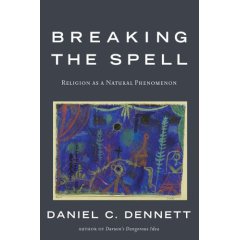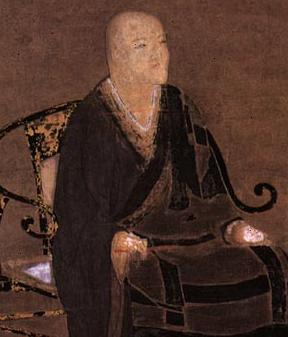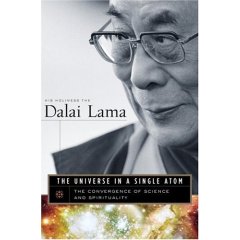In What is Thought, Eric B. Baum claims that thinking is like a computer program running. Or, that humans are like computer programs. Or something like that, or maybe not, since it’s impossible to tell what he is really saying, or what he thinks “thought” is to start with.
One real good argument Baum has is that many computer scientists think the mind is like a computer. Well, I have a gardener who thinks that the mind is like a garden. Actually, sometimes he thinks it’s like a rake, he tells me.
Baum starts off saying that Turing’s model of computing was intended to capture the essence of thought, so that proves that humans are like computers, since Turing is God. Except that even Baum later admits that Turing was at best trying to model human theorem-proving behavior; certainly “thought” is more than just that.
I’m going to come back to some specific topical comments I have about this book, but first of all I just wanted to mention that reading this book I was seriously scared that my brain was going to rot away. That’s why I actually didn’t read the whole book. I worried that if I did the damage might have been too much to undo. For instance, take the following sentence, right in the first section where he’s laying out his basic ideas: “The execution of a computer program is always equivalent to pure syntax.” This isn’t merely stupid—-it goes beyond that to just being completely meaningless. “Mind typically produces a computer program capable of behaving.” Huh??? Is mind producing the program, or is it the program, or what? “The mind exploits its understanding of the world in order to reason.” Except, apparently, in the writing of this book. “Mind is essentially inherent in the DNA, in some sense.” Yes, in a sense that we will never understand from this gibberish.
Baum’s writing gives new meaning to the word “circular”. He asserts that the mind has “subroutines”, and then that proves that it’s like a computer program. I guess he’s a few decades behind in his computer science, or else he would have said the mind is “object-oriented.” “Awareness is awareness of meaningful quantities.”
In a book like this, the author of course could not omit a discussion of neural networks. Baum thinks that neural networks are a “model of brain circuits”, which by the way is wrong—-they’re a computing model vaguely inspired by brain physiology. He’s right when he says the collection of weights generated by training a neural network is in general completely opaque—humans cannot figure out how the neural network works. Nothing in a trained neural network corresponds to a “human” understanding of the problem the net has learned to solve. So if the brain is a neural network, how does this correspond to the “semantics” he talks about? If the mind is composed of subroutines, and evolution is a neural network training process, how does a neural network generate subroutines? More critically, a neural network has its initial topology defined by a human; is he saying that evolution can also evolve the appropriate network structure? He says “it is impossible to…evolve…code unless it is modular.” But trained neural networks are precisely not modular.
“Neural circuitry is akin to an executable. The DNA is more like the source code.” A cute analogy, which might work real well in the term paper the sophomore at MIT who took philosophy for his one required humanities course had to write. But what does this mean? Is the DNA what is being created by evolution? In that case, what is the equivalent of the compiler?
Baum doesn’t do much better with basic philosophy. He asks the big question: What are objects? Are they just in your mind or is there an outside physical reality to them? He then imagines he is somehow addressing this question by jumping to the question of how we know a cup is something to hold by its handle and then drink a liquid from. Sorry, Eric, saying that “the mind is an evolved program” (using a subroutine for the cup problem, of course) does not answer any questions about the nature of reality.
Baum goes on to talk about the process of individual humans learning as being the acquisition of new subroutines. This is weird. We have some built-in subroutines coming from our DNA or something and then we learn new subroutines? Are these subroutines we learn encoded in the same “language” as the ones coming from our DNA? How do they interface with them?
Now we take a big jump, to an agent-based model. There are lots of little agents running around each with their own agendas and utility functions. This model is sort of proved to be right by the fact that it’s also a model which can describe market economies. Taking a sudden right-wing detour, Baum posits that the agents work so well because they have “property rights” and try to conserve money. The agents compete and cooperate. But who set up the system within which these agents (which are also subroutines, I suppose) operate?
“Evolution has learned to search in semantically meaningful directions.” So now we have not only a learning process embodied within evolution, but a meta-learning process governing the process of evolution itself. Evolution evolves!
I’m a go player, and well-versed in the issues facing computer go. So I was particularly interested in Baum’s thoughts on this topic. I found them to be shallow, poorly informed, and lacking insight. Besides getting basic information, such as who developed what program, wrong, always a bad sign, he offers tautologies such as “Go masters play remarkably strong Go.” First, he says that we have a pre-evolved “program” for “causal” analysis. Then, he says we have a large number of “computational modules…that may very well be directly coded into the human genome”, including topological concepts like “connected”, “surrounding”, and “inside”. Besides the problem that these supposed pre-programmed modules have no connection with “causality”, the fundamental point that these modules being wired deep into our DNA, compared to computer programs which have to calculate the same concepts in a “computationally expensive way”, accounts for human strength at Go is, frankly, absurd. If Baum cannot come to a more sophisticated understanding of the complexity of go, he should not write about it at all.
I’m having a very hard time understanding why people who should know better, like Nathan Myhrvold the former Microsoft executive, would put their names on the back of this book.
Of course, we also need a theory of language. Baum has the answers here as well. Language is just “attaching labels to computational modules”. I see! He sums up his insights succinctly: “All that is needed is to attach a label to a computational module, and the particular module indicated will often be quite salient, because we share inherited inductive biases in the form of modular structure.”
“Evolution thus designed the mind for the purpose of making decisions leading to propagation of the DNA.” “I suggest that this picture will…qualitatively explain everything about our consciousness and our experience of living.” Thank God, I was afraid no-one was ever going to figure that out.
And a last bit of good news: Baum has also solved the age-old paradox concerning whether or not humans have free will. The answer is simple: DNA has evolved a mind which has free-will subroutines!
 Daniel Dennett’s Breaking the Spell: Religion as a Natural Phenomenon is due out at the beginning of February.
Daniel Dennett’s Breaking the Spell: Religion as a Natural Phenomenon is due out at the beginning of February.
 Has anyone by fussing in front of the mirror ever gotten taller by so much as an inch? All this time and money wasted on fashion—do you think it makes that much difference? Instead of looking at the fashions, walk out into the fields and look at the wildflowers. They never primp or shop, but have you ever seen color and design quite like it? The ten best-dressed men and women in the country look shabby alongside them.
Has anyone by fussing in front of the mirror ever gotten taller by so much as an inch? All this time and money wasted on fashion—do you think it makes that much difference? Instead of looking at the fashions, walk out into the fields and look at the wildflowers. They never primp or shop, but have you ever seen color and design quite like it? The ten best-dressed men and women in the country look shabby alongside them.
 Hee-Jin Kim’s
Hee-Jin Kim’s  I must be getting cranky. I’ll pick up a book and find myself arguing with the author right from the first page, sometimes even the first sentence. That’s what happened with
I must be getting cranky. I’ll pick up a book and find myself arguing with the author right from the first page, sometimes even the first sentence. That’s what happened with 